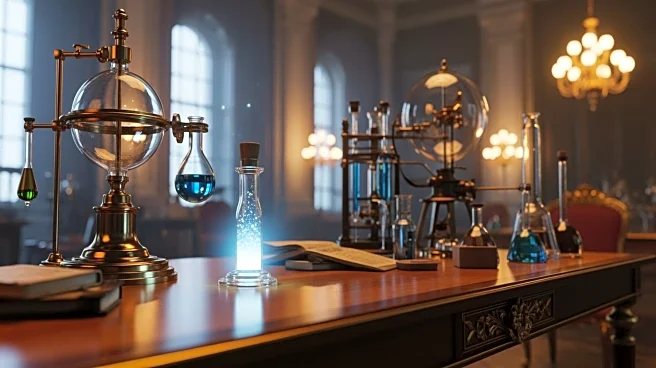What's Happening?
Guillermo del Toro has released a new film adaptation of Mary Shelley's 'Frankenstein,' a project he has envisioned since childhood. The film, starring Oscar Isaac as Victor Frankenstein and Jacob Elordi
as the creature, incorporates elements from various adaptations of the classic novel. Del Toro's version is set against the backdrop of the Crimean War, adding a new dimension to the story. The film explores themes of scientific ambition and human connection, with a focus on lavish set designs and a rich orchestral score. Del Toro's adaptation includes homages to previous film versions and features a creature design inspired by Bernie Wrightson's illustrations.
Why It's Important?
Del Toro's 'Frankenstein' is significant as it revisits a foundational myth of modernity, exploring the tension between scientific progress and human relationships. The film's release highlights the enduring relevance of Shelley's story in the context of contemporary technological advancements. By setting the story during the Crimean War, del Toro adds historical depth, reflecting on the ethical implications of scientific endeavors. The film's lavish production and unique interpretation may influence future adaptations and discussions around the themes of creation and responsibility in science and technology.
What's Next?
The film's release may spark renewed interest in classic literature adaptations and discussions on the ethical dimensions of scientific progress. It could lead to further exploration of similar themes in cinema and other media. The reception of del Toro's 'Frankenstein' might influence future projects in the genre, encouraging filmmakers to blend historical context with classic narratives. Additionally, the film's success could pave the way for more ambitious adaptations of literary classics, potentially inspiring a new wave of Gothic and horror films.
Beyond the Headlines
Del Toro's adaptation of 'Frankenstein' delves into the cultural and ethical implications of scientific ambition, reflecting on the potential consequences of unchecked technological advancement. The film's focus on lavish visuals and historical context offers a fresh perspective on the classic tale, emphasizing the timeless nature of its themes. This adaptation may prompt audiences to reconsider the role of science in society and the moral responsibilities of creators, fostering a deeper understanding of the narrative's relevance in today's world.











